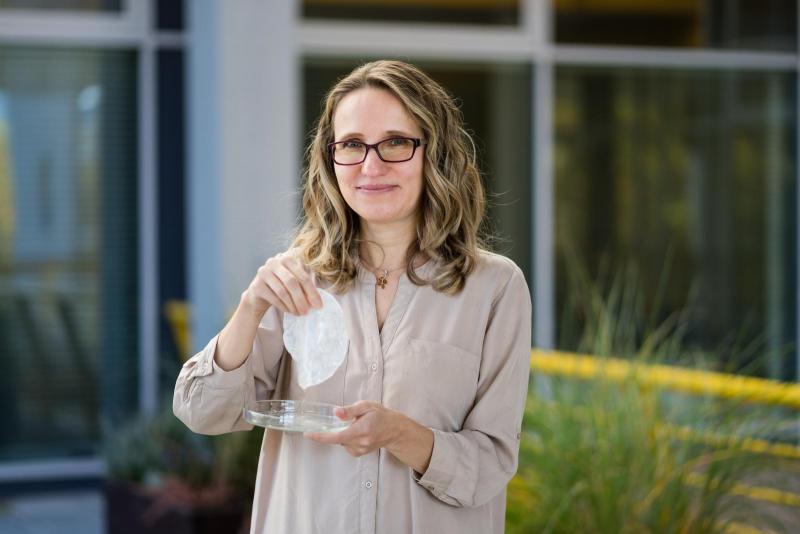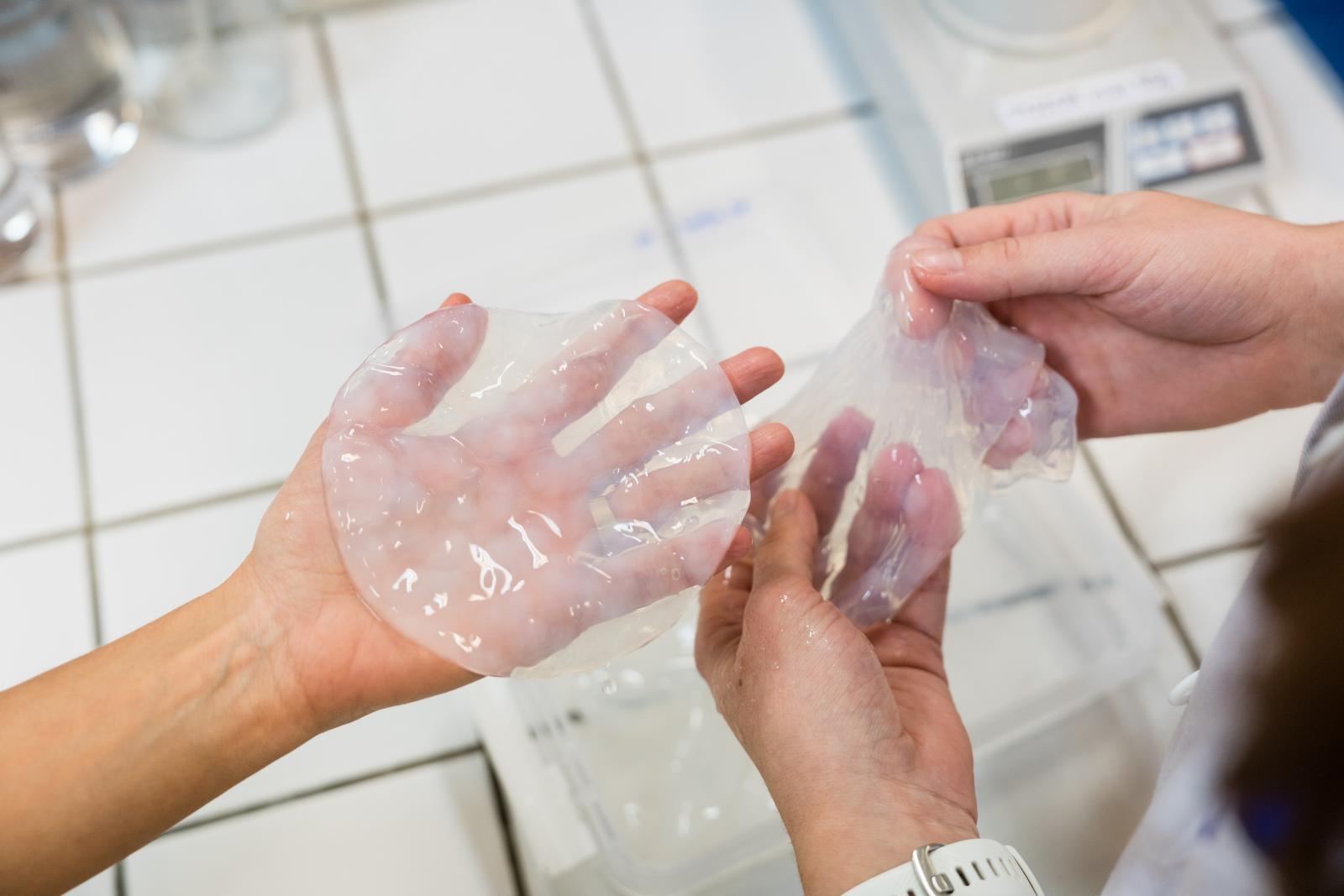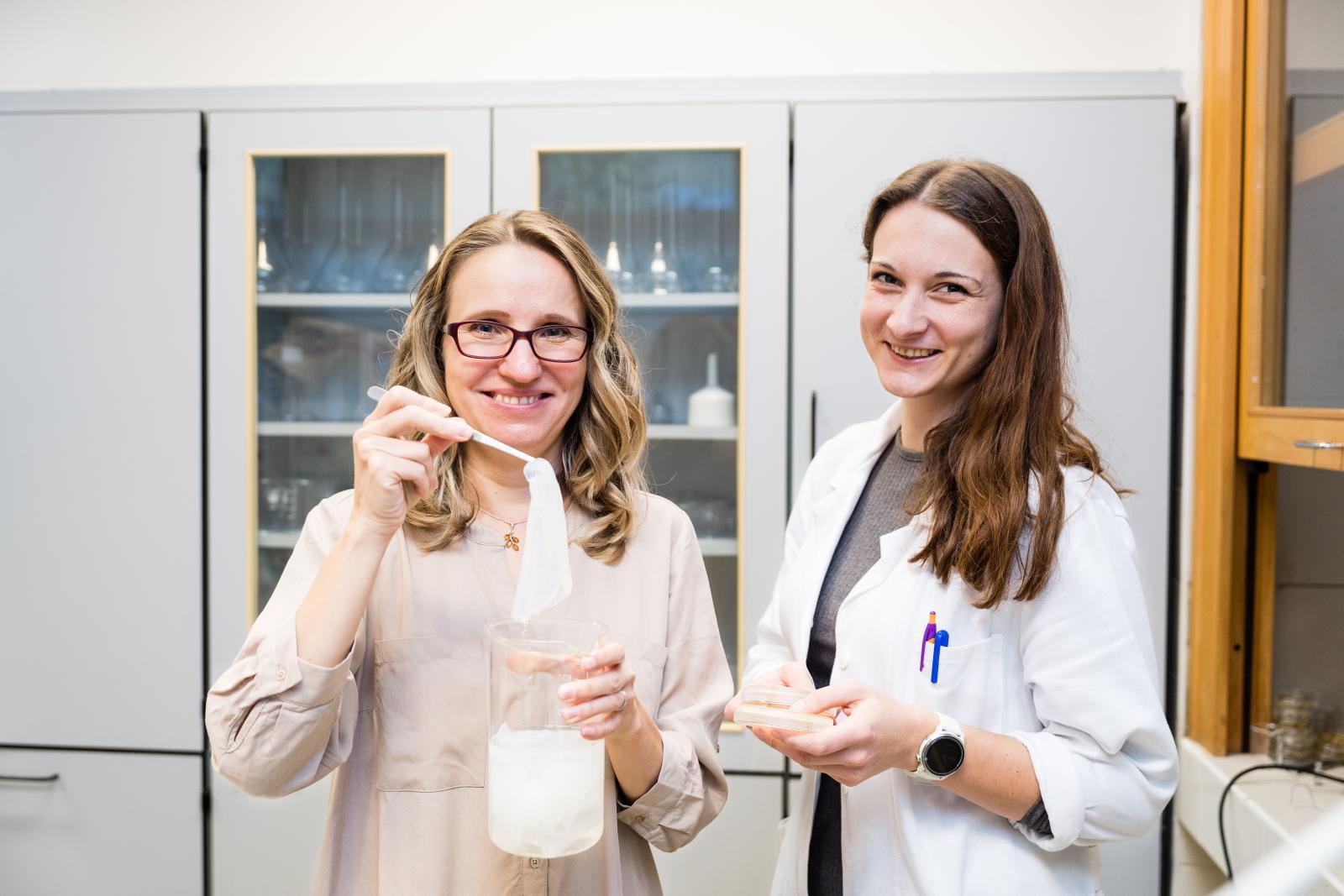Topic
„Plastics will always be here, we just need to treat them differently," says the chemist Adriána Kovalčík, who has learned to face challenges

She did not plan a scientific career during her studies, but several fundamental life challenges led her to the day when she was proposed by the BUT scientific council for the appointment of a professor. Adriána Kovalčík has had an interesting scientific journey behind her, driven by her interest in biodegradable polymers. Her last stop so far is the Institute of Food Chemistry and Biotechnology at the BUT Faculty of Chemistry, which will hopefully also be her final stop.
Adriána Kovalčík comes from the Slovak village of Skalité on the Czech-Slovak-Polish border and considers it important for her career that she grew up in a multicultural environment and that her parents raised her to be tolerant. She liked chemistry since the primary school, but after graduating to become a pharmaceutical laboratory technician, she started a job in a pharmaceutical company and had no higher ambitions. But when she observed self-confident university students who came to the company without knowing anything about practice, she decided to study chemistry at the Faculty of Industrial Technologies in Púchov of the Alexander Dubček University of Trenčín.
She successfully completed her diploma thesis focused on polymers at the Institute of Polymers of the Slovak Academy of Sciences in Bratislava. "There I realized how interesting research can be and that I would like to work there. So, I continued my scientific career and in 2005 I got my PhD degree in macromolecular chemistry at the Slovak University of Technology in Bratislava. However, in order to continue working at the Slovak Academy of Sciences, I had to go abroad for half a year. That was another important challenge. About a year later, I went to France for a six-month internship at the Université Blaise-Pascal in Clermont-Ferrand, where I dealt with the modification of biodegradable polyesters with inorganic nanofillers," the scientist recalls of her first stay abroad.
In the meantime, an offer of a three-year post-doc position came from Vienna's BOKU (Universität für Bodenkultur Wien) and Adriána Kovalčík accepted it. Here she deepened her experience in the field of modification of biodegradable polymers. She made compositions with wood flour as a filler and worked on improving the mechanical properties of biopolyesters. It was also important for her that she started teaching here. "I then continued my research and teaching activities in Graz as well. Another challenge I wanted to try was to master the job interview in German. At that time, Graz University of Technology was looking for an assistant professor at the Institute for Chemistry and Technology of Materials. It was for six years, with the possibility of habilitation, and even though I didn't really count on it, after some time I got a call that I was chosen out of eight applicants," Kovalčík says.
In Graz, she had great opportunities, she could work on top equipment, in modern laboratories and with exceptional people. In her research, she focused on the synthesis and modification of biodegradable polyesters. "I started synthesizing biodegradable polyesters, which I didn't know how to do until then, then characterized them and was able to create biodegradable composites with improved thermomechanical properties." In addition, she was selected for a one-year educational cycle for female scientists, which only 12 women from the whole of Austria complete each year. "The cycle offers a series of courses aimed at enabling women to appreciate their own qualities, to be more assertive, and thus to be as successful as men. It gave me a lot, even though I never felt scorn or contempt from Austrian men, neither as a woman nor as a foreigner," the chemist emphasizes.
In November 2015, as the fourth woman in the history of the faculty, she completed her habilitation in the field of macromolecular chemistry and technology and established herself as a recognized researcher in the field of biopolymers and their processing. She knew that she couldn't stay at the university, but she didn't want to leave Austria anymore, so in February 2016 she joined Wood K plus company in Linz as a key researcher. And she got a little bored. "I was just using what I learned. I had the feeling that I had nowhere to move, and I also missed my students," Adriána Kovalčík admits. When she read on the Internet about Ivana Márová from the BUT Faculty of Chemistry and her research in the field of biodegradable polyhydroxyalkanoates (PHA), she decided to contact her. "As a polymer chemist, I knew how to create polymer mixtures and composites, but I did not understand at all that some microorganisms could create biodegradable plastics, and I wanted to learn it," the scientist explains the background of her journey to BUT.
As part of the SoMoPro programme, she submitted a project in the area of the circular economy, which was connected with the opportunity to work for three years in Ivana Márová's team. "To my great joy, the project was selected for financing despite high international competition. Thanks to colleagues in the team of Prof. Márová I gradually learned biotechnological procedures and works with industrial microorganisms, and over time we achieved very interesting results. In return, I put my Brno colleagues in contact with prestigious foreign scientists, thanks to which we at the faculty managed to get several projects and student internships within the framework of Erasmus," the scientist explains. In the third year of the project solution, she also got the opportunity to participate in teaching. Within a few years, she was able to stabilize her own research team focused on macromolecular chemistry and biopolymers. When she was then offered a permanent position as associate professor at the Institute of Food Chemistry and Biotechnology with the possibility of introducing new subjects, she gladly accepted.

When asked what the future of plastics is, Adriána Kovalčík answers: "Plastics will always be here and that's okay, because without them the industrial revolution would never have gotten this far." Conventional plastics without the possibility of biodegradation have their place, or possibly recyclable, but also biodegradable plastics." And so Adriána Kovalčík is currently facing the last in a series of challenges in his life, perhaps the biggest. It continues to search and test strategies and procedures suitable for the processing, valorisation and minimization of plastic waste. "Plastics are good, we just need to treat them differently so that we don't generate waste that future generations won't know how to deal with," the chemist concludes.
Bold innovation in recycling: researcher Silvestr Figalla turns waste sludge into a valuable raw material
From Munich to Brno by bike: Interview with double degree student Jana
Invisible identification mark protects rare archival materials and art prints
Ecodesign as a path to sustainability: Researchers from FCH BUT help Czech companies prepare for the future
PhD student Jiří Lindovský: I enjoy tackling the challenges of transferring experiments from the lab to practice